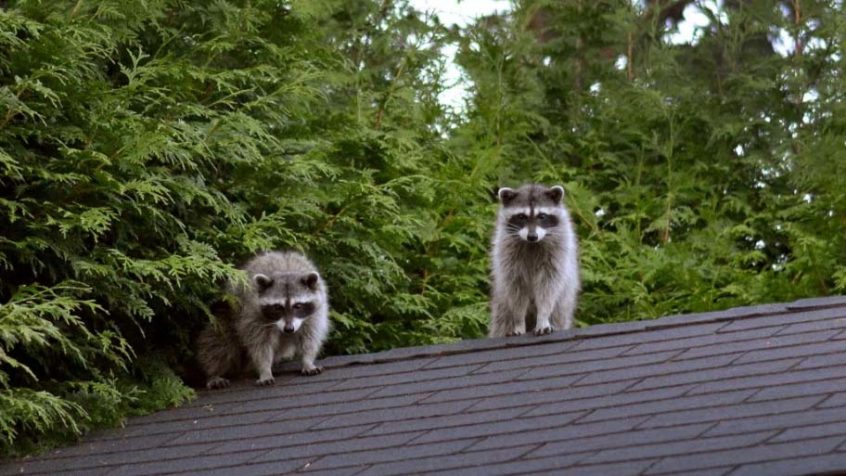How to Keep your Property Raccoon Free
Often found in suburban areas, raccoons are smart, resilient, and surprisingly athletic. Not only can they run and jump, but they also are capable of climbing and swimming, making them particularly adept at getting into garbage cans and gardens, or taking a dip in the swimming pool – no matter how well they are protected. Since they are nocturnal animals, raccoons feed after the sun goes down. As omnivores, they eat practically everything, ranging from table scraps to cat food. They scrounge the ground around trees, picking up fruit that has fallen. They have been found to go for a dip in the pool if you have one. Even though they are technically wild animals, most raccoons in suburban areas have become accustomed to being around people, which means that they aren’t timid about visiting yards or gardens. This is especially true if there is a source of water, such as a swimming pool, fountain or birdbath nearby.
Raccoon Removal and Exclusion
One of the main reasons that we find people are calling for raccoons is if they find animal poop in their pools. Raccoons will go for a swim in your pool and often leave you a surprise on the first step of your pool. To remove the raccoons that have been pooping in your pool will require the placement of several traps all around the property since raccoons are just one of the many wildlife that creeps around at night. We need to place enough traps to make sure that we capture and remove the proper culprits.
If you find raccoon feces in your pool, there is a good chance that they have made a home in your attic. Mother raccoons will break into your attic to give birth once they set up their nest. Your attic becomes the home for their babies and all the litters after that. Over the years, we have developed a proven method for the removal of raccoons from attics using our proprietary repellant, which contains absolutely no toxic chemicals. We even set up wireless cameras to monitor your attic to be entirely sure that the mother raccoon and all of her babies have evacuated. After all the raccoons have been removed, we use our proven exclusion methods to make sure they don’t come back.
If you think you may have raccoons visiting your property after dark, watch for these signs:
- Raccoon sounds coming from the attic.
- Raccoon feces on the first step entering into your swimming pool.
- Garbage cans that have been opened or tipped over, with trash littering the surrounding area
- Parts of the lawn or nearby garden beds that have been dug up
- The unexplained disappearance of fish in backyard ponds, fountains, or water gardens
- Birdfeeders that are empty in the morning – mainly if the feeders have sustained damage during the night
- Garden produce that is only partially eaten.
- Tubular-shaped droppings, frequently located near piles of wood, at the base of trees, or on logs
Raccoons are incredibly talented and determined, which makes keeping them out of your yard or garden challenge. There are some steps that you can take, however, to keep these little prowlers away. Check out these seven strategies for raccoon-proofing your property.
How to Keep Raccoons Away Naturally
1. Secure your garbage. Raccoons find trash irresistible, which means that you need to take extra steps to ensure that your garbage is safe and secure. If your garbage can does not have a locking lid, hold the cover in place by putting a cinderblock on top of it or by strapping it down with a bungee cord. Double-bag your garbage using heavy trash bags to keep the odor to a minimum.
2. Keep your yard clean and well-maintained. Animals like raccoons prefer areas with lots of hiding places. By keeping your trees and shrubs pruned and regularly mowing your grass, you can reduce the number of places where they can hide. Other steps you can take include using chicken wire to close off any areas around the bottoms of sheds, decks, or outbuildings. You can always hide the wire behind the decorative lattice. Any places where raccoons could get into your property should also be tightly sealed to keep them out of your chimney or attic.
3. Startle them. Strobe lights, motion-activated sprinklers, and radios can all be used to scare away raccoons when they come onto your property. Try alternating between different techniques to keep the raccoons from getting too familiar with a particular distraction.
4. Put a fence around the garden. While a fence can provide some protection for your vegetables and plants, raccoons are capable climbers. Electric fences are the most effective option. Opt for a two-wire model, with one wire 6 inches above the ground and the other 12 inches above the ground. Use a timer to activate the fence after the sun goes down automatically.
5. Try raccoon repellent. There are commercial repellents available, which may or may not be sufficient, depending on how determined the raccoons are to get into your yard. There is some anecdotal evidence that corn can be protected from raccoons by planting pumpkin vines or prickly squash around it. Putting cayenne pepper in with the birdseed can also keep raccoons from raiding your bird feeders. The cayenne pepper won’t hurt the birds using the feeder.
6. Get rid of any food sources. Collect fruit from the ground around your trees and avoid allowing produce to stay on the ground in your garden. If you plan on using a compost bin, choose one with a cover that locks. Birdfeeders should be hung in an area that raccoons can’t reach. Alternatively, you can bring them in when it gets dark.
7. Protect your pets. Pet doors should be locked at night to keep raccoons from gaining entrance. Any pet food should be picked up, as well, since raccoons are particularly drawn to it. Please keep your pets’ vaccinations current in case they come face-to-face with a raccoon since they are known carriers of distemper and rabies.
Raccoon Removal and Exclusion for Over 20 Years
Our team here at Wildlife Removal Services of Florida has been servicing the greater Palm Beach County area for over two decades and has no intention of stopping. We are license and certified wildlife removal and pest control experts who know how to get the job done right. We utilize only the most effective humane methods to resolve your nuisance animal problems while never using any poisons. If you need some Raccoons removed or any other type of wildlife ranging from bats, rats, ducks, iguanas, opossums, bees and more!. Just dial (561) 212-9255 to be connected immediately with someone who can help.

